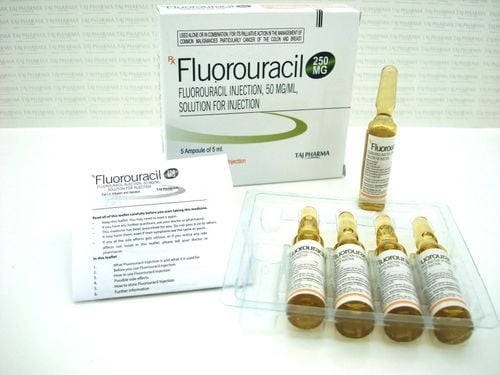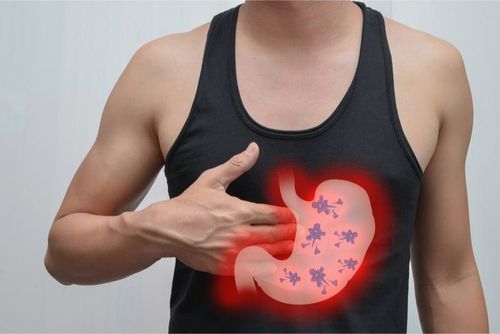This is an automatically translated article.
In Vietnam, stomach cancer is the third leading cause of death in both women and men. Stomach cancer is often detected late and many complications appear at this stage.
1. Epidemiology of gastric cancer
Around the world, stomach cancer is a fairly common cancer, the incidence varies by geography, region, race,... Japan, China, Chile, Iceland are the countries recorded. large number of patients with gastric cancer. The mortality rate from stomach cancer is also alarming, with up to 10,800 patients dying each year in the United States. Also according to the country's epidemiological report, stomach cancer is most common in blacks, American Indians and Hispanics.
In Vietnam, statistics show that stomach cancer is the third leading cause of death after liver cancer and lung cancer. Although medical advances allow early detection of gastric cancer, gastric cancer patients often arrive late because the early stages are often asymptomatic or symptom-free.
Stomach cancer can be related to some of the following factors:
Age: The incidence of stomach cancer increases with age, the most common age is from 50 years old. According to statistics from the American National Cancer Society, up to 60% of patients diagnosed with stomach cancer are 65 years of age or older. In Vietnam, recently, stomach cancer tends to be younger with many patients being diagnosed at a younger age. Gender: GLOBOCAN 2020 shows that the rate of stomach cancer in Vietnam is about 2 times higher in men than in women. People with relatives with stomach cancer: Many studies have shown that people who have a close relative (father, mother, or brother, sister) with stomach cancer have an increased risk of stomach cancer. 2 - 10 times more people with no family factors related to stomach cancer. People infected with Helicobacter pylori bacteria, people who eat a diet high in salt or foods containing nitroso compounds, and people with chronic gastritis have an increased risk of stomach cancer.
2. Complications of stomach cancer
Patients diagnosed with stomach cancer and family members often wonder if stomach cancer is dangerous? Stomach cancer, if detected at an early stage and treated correctly and in time, will increase the chances of recovery, cure, and prolong the patient's life. However, most patients are diagnosed with the disease at a late stage, and there are even patients hospitalized for complications of stomach cancer before being diagnosed.
Stomach cancer is dangerous for people because of the complications it causes. Common gastric cancer complications include:
pyloric stenosis, pyloric obstruction: pyloric stenosis is a condition in which food is difficult to circulate from the stomach to the duodenum, this is the most common complication in the disease. gastric cancer patients when the tumor in the antrum is ulcerated or infiltrates the stomach wall. pyloric stenosis, pyloric obstruction is a surgical emergency that, if not treated promptly, can lead to dehydration, electrolyte disturbances or acid-base disturbances in the body. Gastrointestinal bleeding: Gastrointestinal bleeding is a complication that can occur at any site of gastric tumor, which can progress from a mild level such as oozing bleeding to a severe level such as massive bleeding, affecting the blood. life threatening to the patient. Patients with gastric cancer who are bleeding profusely often present with chronic anemia. Mechanism of severe gastrointestinal bleeding is often due to gastric cancer invasion and damage and destruction of blood vessels, causing patients to vomit violently fresh blood or defecate black, even bloody stools. red if acute bleeding is profuse. Gastric perforation causing peritonitis: Gastric perforation complications often appear on the background of ulcerative cancer or crumbling cancer tissue. Gastric perforation is a surgical emergency that cannot be delayed, because if delayed, peritonitis can develop, which is life-threatening. Sometimes there is a gastric perforation, but it is attached to the surrounding organs such as the liver, pancreas, or colon, so clinically the patient does not have symptoms of gastric perforation. There are also cases from that adhesion, gastric cancer lesions destroy the liver and pancreas, forming deep ulcers into these organs, or forming holes from the stomach to the colon, manifesting symptoms of dysmenorrhea. digestive disorders. Rarely, gastric cancer invades the colon causing intestinal obstruction. In addition to the above complications, advanced gastric cancer can follow the lymphatic route, the blood route to metastasize to nearby lymph nodes or distantly to other organs in the body, making cancer treatment difficult. Cancer becomes more difficult and prognosis is poorer in these patients.
Malignant lesions may metastasize through the lymphatics of the serosa, creating diffuse peritoneal metastases. The common manifestation of gastric cancer with peritoneal metastases is peritoneal effusion from small to large amounts, patients sometimes have distended abdomen causing difficulty breathing. In addition, gastric cancer can spread to regional lymph nodes, especially lymph nodes in the lesser curvature or lymph nodes around the abdominal aorta, or metastasize to supraclavicular nodes, most commonly left supraclavicular nodes. Stomach cancer in women can metastasize to one or both ovaries (Krukenberg tumor). Stomach cancer can follow the bloodstream, causing liver, lung, and bone metastases.
3. Can you die from stomach cancer?
Stomach cancer is classified as a cancer with a high mortality rate. This rate is higher in patients with advanced gastric cancer. Patients can die from complications of stomach cancer, or because of secondary damage to other organs that reduce the body's function. Another reason that should also be mentioned is that the erosion in gastric cancer, patients who have undergone gastric bypass surgery often have more limited nutrient absorption than the general population, in the advanced stage of the disease. The growth of the tumor makes the body thin and exhausted, which also contributes to the increased mortality rate in gastric cancer patients.
Studies in patients with gastric cancer have shown that the later the disease is detected, the lower the 5-year, 10-year survival rate. If gastric cancer is detected at stage I, more than 70% of patients live more than 5 years, and more than 60% of patients live more than 10 years after diagnosis. In patients with stage II gastric cancer, about half of these patients live more than 5 years. This rate in patients with stage III gastric cancer is nearly 40%. If stomach cancer is detected at stage IV, only about 5-10% of patients survive for more than 5 years.
In summary, the more advanced gastric cancer is, the higher the complication rate and death is the final complication of the disease. Stomach cancer is a dangerous disease, but if detected early and treated promptly can increase survival time and reduce mortality.
Currently, early cancer screening is considered the perfect measure in the timely detection and treatment of all types of cancer. Reduce the cost of treatment and especially reduce the mortality rate in patients. Vinmec International General Hospital always deploys and introduces to customers the Early Cancer Screening Package at Vinmec - Peace of mind to live well to help with gene testing, imaging, testing of biomarkers to detect tumors you early.
Choosing the Early Cancer Screening Package at Vinmec - Peace of mind to live healthy, customers will receive:
Only one gene test can assess the risk of 16 common cancers in both men and women ( lung cancer, colorectal cancer, breast cancer, pancreatic cancer, cervical cancer, stomach cancer, prostate cancer,...). Early detection of early signs of cancer through imaging, endoscopy and ultrasound. The operation is simple, careful and accurate. A team of well-trained specialists, especially in oncology, are capable of handling cancer cases.
Please dial HOTLINE for more information or register for an appointment HERE. Download MyVinmec app to make appointments faster and to manage your bookings easily.













